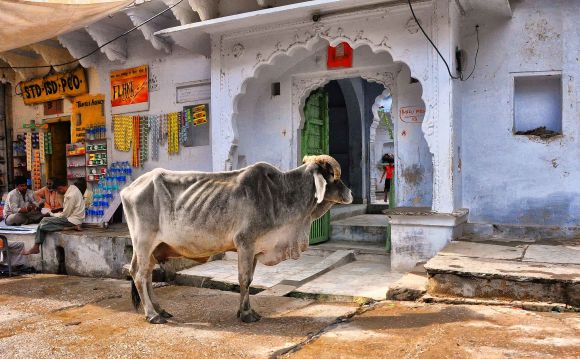
You’ve heard about India’s sacred cow, the Mother of Civilization, a gift from God that has become a part of Indian iconography, religion and culture. The cow protection movement began in 1882, and ended the slaughter of the animals in what was then British India. The cow is revered because it is unique in that it offers five products to humans — milk, curds, ghee butter, urine and dung — all of which are useful to everyday life in India. In addition, the beast of burden has traditionally been used to help plow the fields and pull carts for transportation. If you’re one of those people who likes to dress up your dog, or cat, or buy them their own kotatsu, then we can only imagine what you’d do for a pet cow if you had one! You’ll have no problem understanding the high regard Indians place on the gentle bovines.
Because we at RocketNews24 love all animals, cows included (although some of us delight in their taste while others of us would rather give cow cuddles), we can totally understand the pampering, dressing up, and general all-round generosity the Indians heap upon their beloved cows. We just hope cats don’t catch on to any of this.
Just how far will Indians go to pamper their bovine friends? Glad you asked! Our bovine journalist is about to reveal some fascinating facts about cows in India.
Mooving right along, here are some fascinating facts about cows in India:
1. Cows can marry!
Did you ever doubt that in bovine-centric India, cows could marry? In 2011, Anusulya Vishwak and her husband in Guradia, India decided to marry off their little white cow named Sadhana, whom they had raised since she was little. The parents of the bride had no human children of their own, but Anusulya said she was merely doing for the heifer the same as she’d do for her own daughter. After finding a suitable mate, preparation for the nuptials took two months (imagine the stress–something old, something new, something borrowed, something blue!) and reportedly cost 200,000 rupees (US$3,230). Sadhana was outfitted with yellow flowers in her hair and what looked like a designer red blanket with gold trim. The black bull donned a red headdress with a multicolored blanket hanging casually over his back. They were paraded through the street in a garlanded open-air tractor-trailer with the costumed couple riding in the back, looking very smug. At the end of the ceremony, Anusulya kissed the happy little wife while the new husband looked on rather jealously. Wouldn’t you have loved to have been one of the 1,500 guests in attendance?!
More recently, in April of 2014, in Madya Pradesh, Ganga the cow (adorned in a red blanket and mala garland) and Prakash the bull (wearing an orange turban) were married on the advice of a holy man who told the villagers that this matrimony would bring good luck and save the state’s harvest from natural disasters. The ceremony was performed by a bearded, long-haired Sadhu and was attended by over 5,000 guests, many of whom had donated a portion of the 1 million rupees (US$16,000) necessary to hold the wedding. The bride and groom entrusted the entire affair to a team of 25 people who pulled it off without a hitch.
2. People can marry cows too–and sometimes they do!
2. People can marry cows too–and sometimes they do!
We’ve heard about people marrying anime characters, so what the hell, why not cows? At least when you snuggle up with them, they’ll respond by licking your face. One Indian man video-taped his wedding to a much younger, but very petite and adorable, brown cow. The marriage, which took place in November of 2013, was approved by his grandmother. The bride was not as decked out as her compatriots Sadhana or Ganga, preferring to go with a more subdued, organic look. She wore a simple flower garland and a wedding blanket made with sustainable satin draped over her back. It looked recyclable. For perhaps the biggest day in a person’s life, the bride seemed a bit, well, disinterested, and even stopped to munch some greens on the way to the venue in the middle of the forest. This is probably because she knew she was just a stand-in. According to the video, the man was prompted to tie the knot with the bovine after being unable to find a woman to marry. He was urged to seek council with a soothsayer, but the news was not so soothing: the fortune-teller told him that when he did marry, his wife would die soon after. Luckily, there was a viable solution–marry a cow! After that, the clairvoyant said, the curse would be lifted and he could look for a more appropriate wife. We can only hope the couple enjoy a few years of marital bliss until the inevitable separation. Do you think they’ll take a honeymooon?
But sometimes the curse-lifting bovine gets shafted
If you’re a bit old-fashioned and still think a couple should marry before having sexual intercourse, then you needn’t feel alone. In June of 2010, far from India but in another Hindu community, an 18-year-old Balinese male named Ngurah Alit was forced to marry a cow after the little floozy allegedly wooed him into the pasture. Alit’s admission to the one-night stand came after he was caught rolling in the hay with the tawny brown bovine. At any rate, the village held a pecaruan ceremony, necessary to cleanse the town of any curse brought on by the dirty deed, and arranged a marriage for the two. During the ceremony the poor boy apparently passed out but this only delayed the wedding slightly, and the couple were eventually united. Unfortunately, the newlyweds were denied a honeymoon as the pecaruan ceremony also dictated that the cow be drowned. The boy was also drowned, but only symbolically, by having his clothes thrown into the ocean. The poor cow obviously didn’t have a very good lawyer.
3. In India, killing a cow is a crime
▼You wouldn’t dare kill me, would you?
In many Indian states, killing a cow is a crime which can land you in prison for up to five years (Do you think butchers get life in prison?). It is also illegal to export the ruminants for the purpose of slaughter. Reportedly, two million cows are smuggled across the Indian border into Bangladesh every year and approximately 1,000 cow smugglers in the past 10 years have been slain by India border security. So no matter how much you may love beef, cow cuddling is always a better option than cow smuggling!
4. Drinking cow urine is considered healthy
▼Cow urine storage pots
Cow urine is an integral part of Indian Ayurvedic medicine. Yogis in India have been drinking urine for over 3,000 years and drinking cow urine is still proscribed as a bio-enhancer to: purify the body and help control the aging process, control and destroy free radical cells, repair damaged DNA, and help fight cancer. Cow urine is also said to have antibiotic properties. So there you have it, when it comes to health, urine therapy is truly “number one.”
5. Cows are featured in many festivals, including the Cow Dung Festival
▼Decorations and milk pots used in Pongal, a four-day festival that dedicates one day, called Mattu Pongal, to the cow.
Cow dung is a natural, organic product that can be used as is, with few modifications, and you don’t even need to go buy it at the store! And there’s plenty of it too, as India has the world’s largest dairy cow population. Bovine feces, called gobar, is used as fertilizer for crops and provides energy via bio-gas for households. So naturally, there is a cow dung festival to celebrate! Indian farming is so bovine-centric that some people say India has a “gobar economy.” There’s your cow buzzword for the day!
6. Gopastami is an annual holiday for cows
▼Often shown seated, Nandi the bull serves as a vehicle for the god Shiva in the Hindu religion.
As if several festivals a year dedicated to cows isn’t enough for the cloven-hooved brethren, some Indians also celebrate Gopastami, a cow holiday. Gopastami, which has nothing to do with pastrami, is the day Lord Krishna and his elder brother became official cow herders. All cows are celebrated on this holiday, a bit of a cow appreciation day. Cows are bathed and dressed up in their most fetching attire and taken to the temple where they are given offerings in hopes that the ruminants will continue to give the gift of life. So please, remember to thank a cow at least once a year for their humanitarian services.
7. India has a Ministry For Cows
Otaram Devasi was recently appointed India’s first “Minister of Cows” in a new position designed to protect the sanctity of the cow.
▼It is unclear if the new “Minister for Cows” will still allow cows to walk all over their owners.
While India once had 100 or so indigenous cow species, the number has fallen recently to just 36. The Indian Desi cow is almost extinct. With mechanized transport, tractors for harvesting and chemical fertilizers that all preclude the use of the cow, the role of the useful bovine in daily life is in commensurate decline. As cows are no longer needed for labor, cross-breeding with Western dairy breeds such as Holsteins and Jerseys that produce more milk, is becoming common (although these breeds don’t hold up to the heat as well), leaving the hearty Indian varieties to slowly die off. Several cow sanctuaries have been set up in India to help deal with this problem. Hopefully the spiritual value of the cow will not decline as one can hardly argue against a religion that worships such a peaceful and docile animal. We wish the new Minister of Cows the best of luck preserving this beautiful animal!
8. Cows don’t need licenses to use the roads
Although cows can’t get driving licenses in India, that doesn’t stop them from being able to legally use the roads. We leave you with this video of eight minutes of cows on the roads of India! We just can’t stop watching this mesmerizing video of urban cows!
Now, wasn’t that fascinating? If you know any more fascinating facts about cows, don’t hold out–let us cow-lovers know in the comments section.
Featured Image: Wikipedia (Rod Waddington)
All images © Amy Chavez/RocketNews24 unless otherwise noted.

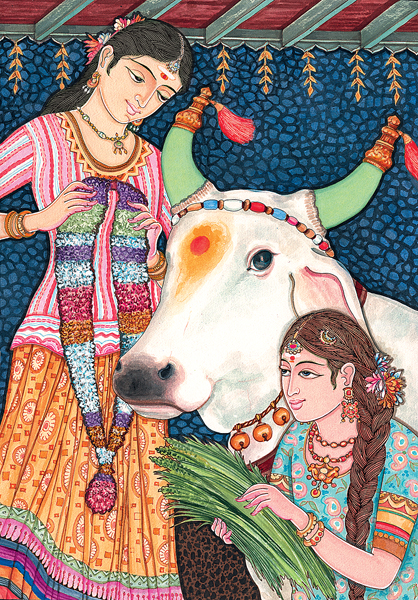
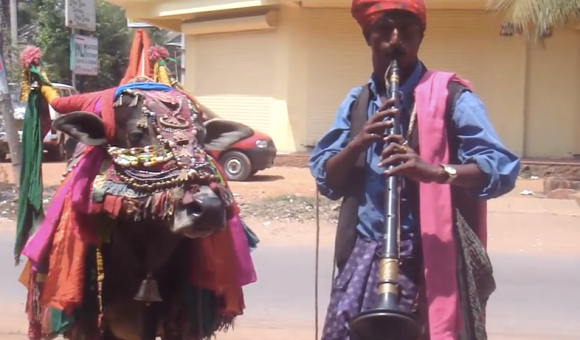
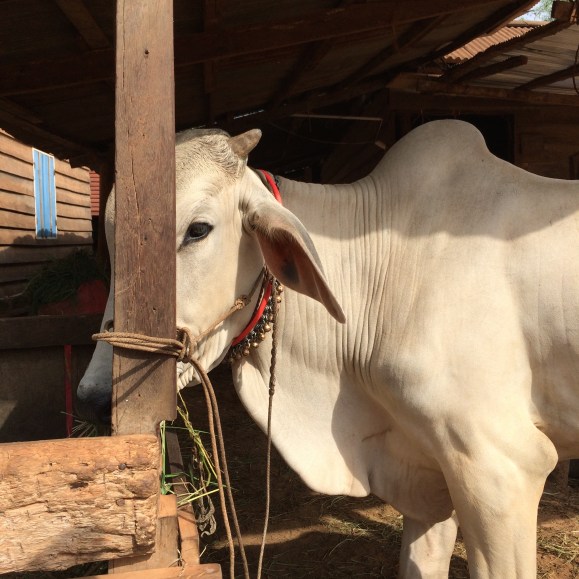
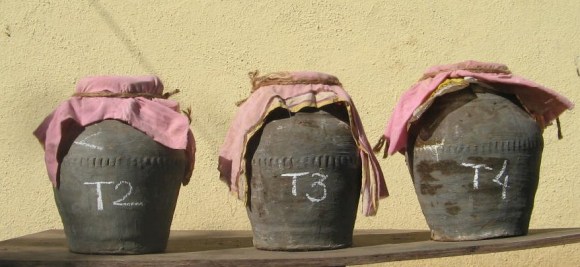
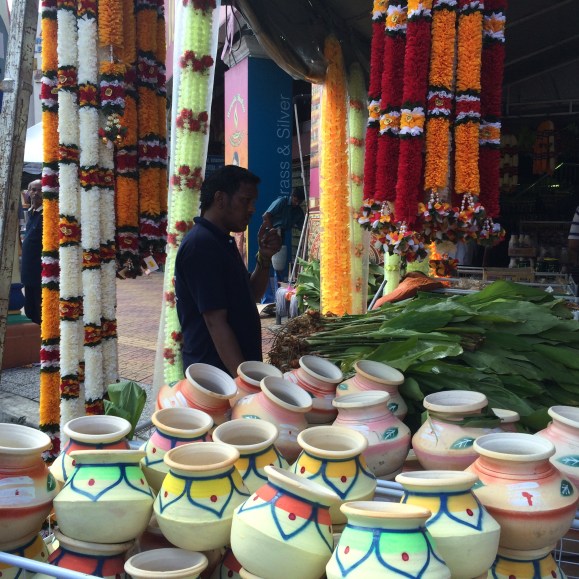
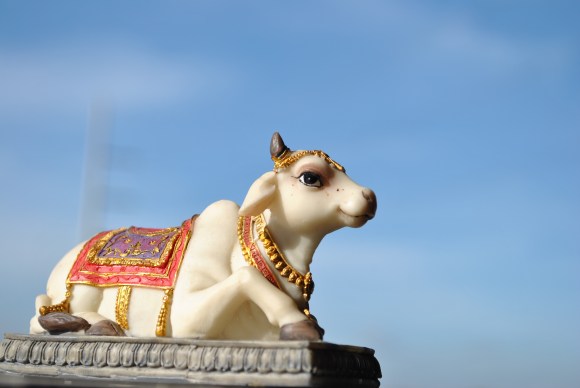
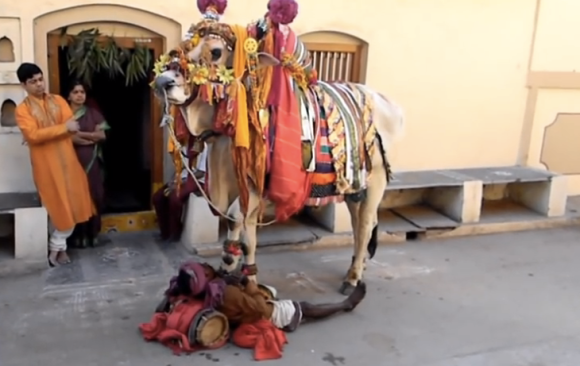
 16 facts about India that will blow your mind
16 facts about India that will blow your mind Chinese zodiac Evangelion characters are here to wish you a happy, chibi Year of the Ox【Pics】
Chinese zodiac Evangelion characters are here to wish you a happy, chibi Year of the Ox【Pics】 【Exploring Unfamilar Japan】We have dessert and meet a cow named Julia at an organic island café
【Exploring Unfamilar Japan】We have dessert and meet a cow named Julia at an organic island café Nissin Cup Noodle is offering a promotional life-size water-dispensing cow
Nissin Cup Noodle is offering a promotional life-size water-dispensing cow Japanese teacher suspended for selling a lot of cows without telling the school
Japanese teacher suspended for selling a lot of cows without telling the school How to order snacks on a Shinkansen bullet train in Japan
How to order snacks on a Shinkansen bullet train in Japan Demon Slayer: Kimetsu no Yaiba gets new roller coaster attractions and food at Universal Studios Japan
Demon Slayer: Kimetsu no Yaiba gets new roller coaster attractions and food at Universal Studios Japan New Nintendo Lego kit is a beautiful piece of moving pixel art of Mario and Yoshi【Photos】
New Nintendo Lego kit is a beautiful piece of moving pixel art of Mario and Yoshi【Photos】 Japan’s new difficult-to-drink-from beer glass protects your liver, but it’s a brutal experience
Japan’s new difficult-to-drink-from beer glass protects your liver, but it’s a brutal experience Hello, cosmetics! Clinique teams up with Hello Kitty this summer for first-time collaboration
Hello, cosmetics! Clinique teams up with Hello Kitty this summer for first-time collaboration Nintendo history you can feel – Super NES, N64, and GameCube controllers become capsule toys
Nintendo history you can feel – Super NES, N64, and GameCube controllers become capsule toys Which Studio Ghibli house would you most like to live in?
Which Studio Ghibli house would you most like to live in? Japan’s foreign population reaches historic milestone following largest-ever single-year surge
Japan’s foreign population reaches historic milestone following largest-ever single-year surge We check out the local flavors of the commonly confused Ome and Aomi areas of Tokyo in one day
We check out the local flavors of the commonly confused Ome and Aomi areas of Tokyo in one day Japanese gravure idol makes jaws drop with massive M-cup chest 【Pics & Videos】
Japanese gravure idol makes jaws drop with massive M-cup chest 【Pics & Videos】 “The most Delicious Cup Noodle in history” – Japan’s French Cup Noodle wins our heart【Taste test】
“The most Delicious Cup Noodle in history” – Japan’s French Cup Noodle wins our heart【Taste test】 Starbucks releases a cute Frappuccino and Unicorn Cake…but not in Japan
Starbucks releases a cute Frappuccino and Unicorn Cake…but not in Japan Kyoto Tower mascot termination reveals dark side behind cute Japanese characters
Kyoto Tower mascot termination reveals dark side behind cute Japanese characters McDonald’s Japan’s Soft Twist Tower: A phantom ice cream only sold at select branches
McDonald’s Japan’s Soft Twist Tower: A phantom ice cream only sold at select branches Yabai Ramen: What makes this Japanese ramen so dangerous?
Yabai Ramen: What makes this Japanese ramen so dangerous? Finally! Nintendo Japan expands Switch 8-bit controller sales to everybody, Online member or not
Finally! Nintendo Japan expands Switch 8-bit controller sales to everybody, Online member or not Japanese government wants to build luxury resorts in all national parks for foreign tourists
Japanese government wants to build luxury resorts in all national parks for foreign tourists To combat declining birth rate, Japan to begin offering “Breeding Visas” to foreigners
To combat declining birth rate, Japan to begin offering “Breeding Visas” to foreigners 10 things you should buy at 7-Eleven in Japan
10 things you should buy at 7-Eleven in Japan Studio Ghibli releases anime heroine cosplay dresses that are super comfy to wear
Studio Ghibli releases anime heroine cosplay dresses that are super comfy to wear Woman charged for driving suitcase without a license in Osaka
Woman charged for driving suitcase without a license in Osaka Studio Ghibli unveils My Neighbour Totoro miniature house model
Studio Ghibli unveils My Neighbour Totoro miniature house model Kyoto experiencing problems with foreign tourists not paying for bus fares, but not on purpose
Kyoto experiencing problems with foreign tourists not paying for bus fares, but not on purpose Fighting mild hunger with a Japanese soda that turns into jelly in the stomach【Taste test】
Fighting mild hunger with a Japanese soda that turns into jelly in the stomach【Taste test】 Studio Ghibli’s Howl’s Moving Castle tapestry unveiled in Japan for first time
Studio Ghibli’s Howl’s Moving Castle tapestry unveiled in Japan for first time McDonald’s new Happy Meals offer up cute and practical Sanrio lifestyle goods
McDonald’s new Happy Meals offer up cute and practical Sanrio lifestyle goods Sales of Japan’s most convenient train ticket/shopping payment cards suspended indefinitely
Sales of Japan’s most convenient train ticket/shopping payment cards suspended indefinitely Sold-out Studio Ghibli desktop humidifiers are back so Totoro can help you through the dry season
Sold-out Studio Ghibli desktop humidifiers are back so Totoro can help you through the dry season Japanese government to make first change to romanization spelling rules since the 1950s
Japanese government to make first change to romanization spelling rules since the 1950s Foreigner’s request for help in Tokyo makes us sad for the state of society
Foreigner’s request for help in Tokyo makes us sad for the state of society Ghibli founders Toshio Suzuki and Hayao Miyazaki contribute to Japanese whisky Totoro label design
Ghibli founders Toshio Suzuki and Hayao Miyazaki contribute to Japanese whisky Totoro label design Doraemon found buried at sea as scene from 1993 anime becomes real life【Photos】
Doraemon found buried at sea as scene from 1993 anime becomes real life【Photos】 Tokyo’s most famous Starbucks is closed
Tokyo’s most famous Starbucks is closed Princesses, fruits, and blacksmiths: Study reveals the 30 most unusual family names in Japan
Princesses, fruits, and blacksmiths: Study reveals the 30 most unusual family names in Japan Cow herd gathers and mourns after fellow bull hit by a car in Hong Kong
Cow herd gathers and mourns after fellow bull hit by a car in Hong Kong Giant nipple squirts milk from U.F.O. in crazy Japanese commercial【Video】
Giant nipple squirts milk from U.F.O. in crazy Japanese commercial【Video】 We try a rotating sushi restaurant in New Delhi, are surprised to find no rotating sushi
We try a rotating sushi restaurant in New Delhi, are surprised to find no rotating sushi Wagyu vs. kokusangyu – The difference between the two types of “Japanese beef”
Wagyu vs. kokusangyu – The difference between the two types of “Japanese beef” 20 signs you might be in India, according to the Internet
20 signs you might be in India, according to the Internet Virtual YouTuber Kagura Mea Recounts Story of Receiving Poop From Hater
Virtual YouTuber Kagura Mea Recounts Story of Receiving Poop From Hater Vegans rejoice! Japanese vegan fair celebrates meatless meat, organic cola, vegan pet food
Vegans rejoice! Japanese vegan fair celebrates meatless meat, organic cola, vegan pet food In Japan, nothing says “Merry Christmas, Baby” like greasy convenience store chicken
In Japan, nothing says “Merry Christmas, Baby” like greasy convenience store chicken Japanese uncle uses unique methods to give his niece some pocket money
Japanese uncle uses unique methods to give his niece some pocket money Japan’s Ninja Bear shot and killed in Hokkaido, eaten as yakiniku in Tokyo, to become stew next
Japan’s Ninja Bear shot and killed in Hokkaido, eaten as yakiniku in Tokyo, to become stew next Autopsy of deer in a Chinese zoo reveals startling cause of death
Autopsy of deer in a Chinese zoo reveals startling cause of death Where’s my Christmas cake?! Seasonal celebrations threatened by nationwide butter shortage
Where’s my Christmas cake?! Seasonal celebrations threatened by nationwide butter shortage Nationwide Pokémon GO ban sought by Indian lawsuit that claims title is religiously offensive
Nationwide Pokémon GO ban sought by Indian lawsuit that claims title is religiously offensive The Four Lows: Many Japanese women’s new image of the ideal man
The Four Lows: Many Japanese women’s new image of the ideal man The Pissing Tanker: Fighting public urination in India one spray at a time【Video】
The Pissing Tanker: Fighting public urination in India one spray at a time【Video】
Leave a Reply